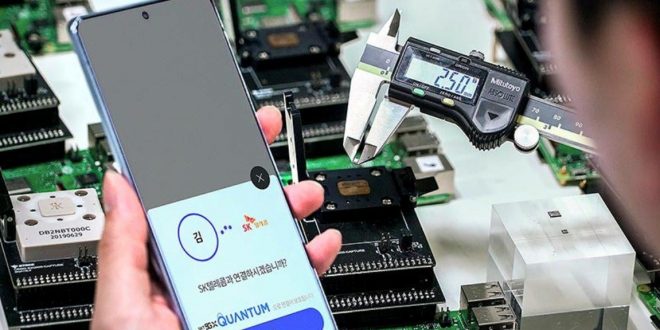As Cyber Fraud continues to pose challenges, mobile companies leverage technological innovations to bolster the security capabilities of their devices. With the launch of a quantum cryptography enabled 2 factor authentication, Samsung claims to take robust security to a whole new level.
The leading mobile phones company has used a chip manufactured by ID Quantique, a Swiss Quantum-Safe technology provider, to provide a safe ecosystem for payments made on the device.
In this article, read how this innovation can provide a secure space on quantum encryption powered devices.
What is Quantum Cryptography
The technology has existed for more than two decades in concept. But, it’s only in recent times that it is finding application in providing nonpareil security to vital data.
Cryptography, in itself, is encrypting data, or in other words, the process of scrambling plain text, which can only be understood with the help of a key. Quantum Cryptography applies quantum mechanics to the process of encryption. This technique can make the encryption so robust that it is virtually unhackable.
Quantum Cryptography utilizes light to transmit data. Photons, or particles of light travel over fiber optic cables, and are detected by receivers.
If the photons have been in any way observed or read by the hackers, it can be detected by the receivers. Hacking can thus be detected effectively.
How is Quantum Cryptography implemented in Samsung Devices
Random number generators are integral to all security solutions in mobile phones. Mass market generators can be predictable, making them vulnerable to hacking.
The embedded chip in the Samsung smartphone has an in-built Quantum Random Number Generator that utilizes mathematical algorithms to construct random cryptographic keys. The chipset has been designed specifically for mobile devices.
The QNRG further transmits these keys with Light Emitter Diodes. These LEDs transmit light signals. These light signals are received by complementary metal-oxide-semiconductor or CMOS.
The chip can create random keys that are unpredictable and quantum technology makes light detection trackable, ensuring security.
Moreover, a password is generated using 2 factor authentication, that makes it stronger.
The QNRG can also store fingerprints and other biometric data. Fingerprints can be used to authorize payments.This further assists in adding security to payments.
List of Samsung mobiles with Quantum Cryptography
Samsung introduced Quantum Cryptography with Galaxy A Quantum back in May 2020. The company has launched an updated mobile, Samsung Galaxy A Quantum 2 in April, 2021. The mobiles are only available in Korea with the telecom provider SK Telecom.
The Quantum 2 smartphone comes with a 6.7” Dynamic Super Amoled display with 1440X3200 2X 120Hz display. Snapdragon 855+ is the processor bundled with 6GB of RAM and 128GB of storage. Camera duties are performed by a 64Mp main camera with OIS along with a 12MP ultrawide shooter and a 5MP macro.
The Quantum Cryptography technology is offered in only these two mobile phones at the moment, but, ID Quantique claims that the QNRG chip is compact and consumes very less power, making it compatible with a wide range of smartphones. Thus, the coming future may see many more phones with this innovative security feature.
Practical Applications of enhanced security
Enhanced security as secure as Quantum Cryptography can open up multiple avenues for industries such as online retail, banking, and others. If payments can have foolproof security, mobiles can be trusted for high value transactions, frequently and pan-industries.
Technologies such as Quantum Cryptography, can foster a highly secure payment ecosystem in m-commerce, opening up multiple practical applications.
Conclusion
The endeavour to make smartphones immune to the ever rising security attacks has given rise to innovative technologies. Quantum Cryptography has set new standards in introducing virtually unhackable encryption.
Being around for 2 decades, Samsung has put a keen interest in the mobile world by embedding the technology in a mass market phone.
With successful practical implementation, the technology may find its way in many other smartphone models, enhancing security and opening up a window of opportunities in industries such as mobile-commerce.
 Next Tech Magazine Get The Latest Technology Updates
Next Tech Magazine Get The Latest Technology Updates





